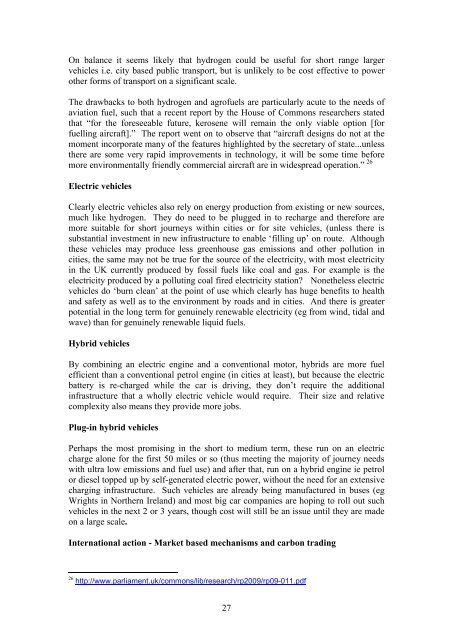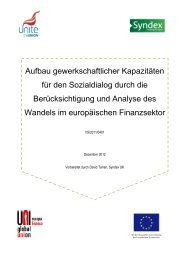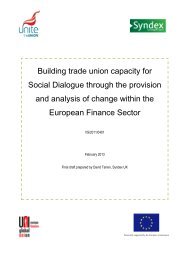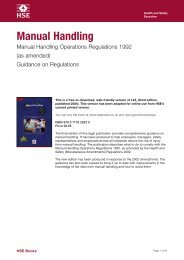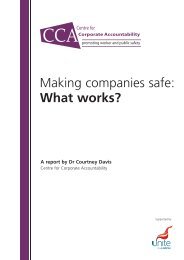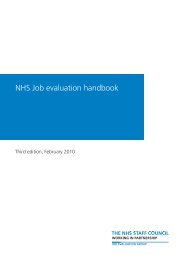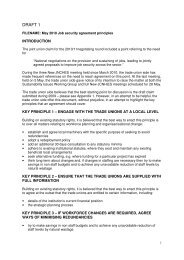Sustainable Transport and the Environment Guide - Unite the Union
Sustainable Transport and the Environment Guide - Unite the Union
Sustainable Transport and the Environment Guide - Unite the Union
You also want an ePaper? Increase the reach of your titles
YUMPU automatically turns print PDFs into web optimized ePapers that Google loves.
On balance it seems likely that hydrogen could be useful for short range larger<br />
vehicles i.e. city based public transport, but is unlikely to be cost effective to power<br />
o<strong>the</strong>r forms of transport on a significant scale.<br />
The drawbacks to both hydrogen <strong>and</strong> agrofuels are particularly acute to <strong>the</strong> needs of<br />
aviation fuel, such that a recent report by <strong>the</strong> House of Commons researchers stated<br />
that “for <strong>the</strong> foreseeable future, kerosene will remain <strong>the</strong> only viable option [for<br />
fuelling aircraft].” The report went on to observe that “aircraft designs do not at <strong>the</strong><br />
moment incorporate many of <strong>the</strong> features highlighted by <strong>the</strong> secretary of state...unless<br />
<strong>the</strong>re are some very rapid improvements in technology, it will be some time before<br />
more environmentally friendly commercial aircraft are in widespread operation.” 26<br />
Electric vehicles<br />
Clearly electric vehicles also rely on energy production from existing or new sources,<br />
much like hydrogen. They do need to be plugged in to recharge <strong>and</strong> <strong>the</strong>refore are<br />
more suitable for short journeys within cities or for site vehicles, (unless <strong>the</strong>re is<br />
substantial investment in new infrastructure to enable ‘filling up’ on route. Although<br />
<strong>the</strong>se vehicles may produce less greenhouse gas emissions <strong>and</strong> o<strong>the</strong>r pollution in<br />
cities, <strong>the</strong> same may not be true for <strong>the</strong> source of <strong>the</strong> electricity, with most electricity<br />
in <strong>the</strong> UK currently produced by fossil fuels like coal <strong>and</strong> gas. For example is <strong>the</strong><br />
electricity produced by a polluting coal fired electricity station? None<strong>the</strong>less electric<br />
vehicles do ‘burn clean’ at <strong>the</strong> point of use which clearly has huge benefits to health<br />
<strong>and</strong> safety as well as to <strong>the</strong> environment by roads <strong>and</strong> in cities. And <strong>the</strong>re is greater<br />
potential in <strong>the</strong> long term for genuinely renewable electricity (eg from wind, tidal <strong>and</strong><br />
wave) than for genuinely renewable liquid fuels.<br />
Hybrid vehicles<br />
By combining an electric engine <strong>and</strong> a conventional motor, hybrids are more fuel<br />
efficient than a conventional petrol engine (in cities at least), but because <strong>the</strong> electric<br />
battery is re-charged while <strong>the</strong> car is driving, <strong>the</strong>y don’t require <strong>the</strong> additional<br />
infrastructure that a wholly electric vehicle would require. Their size <strong>and</strong> relative<br />
complexity also means <strong>the</strong>y provide more jobs.<br />
Plug-in hybrid vehicles<br />
Perhaps <strong>the</strong> most promising in <strong>the</strong> short to medium term, <strong>the</strong>se run on an electric<br />
charge alone for <strong>the</strong> first 50 miles or so (thus meeting <strong>the</strong> majority of journey needs<br />
with ultra low emissions <strong>and</strong> fuel use) <strong>and</strong> after that, run on a hybrid engine ie petrol<br />
or diesel topped up by self-generated electric power, without <strong>the</strong> need for an extensive<br />
charging infrastructure. Such vehicles are already being manufactured in buses (eg<br />
Wrights in Nor<strong>the</strong>rn Irel<strong>and</strong>) <strong>and</strong> most big car companies are hoping to roll out such<br />
vehicles in <strong>the</strong> next 2 or 3 years, though cost will still be an issue until <strong>the</strong>y are made<br />
on a large scale.<br />
International action - Market based mechanisms <strong>and</strong> carbon trading<br />
26 http://www.parliament.uk/commons/lib/research/rp2009/rp09-011.pdf<br />
27


